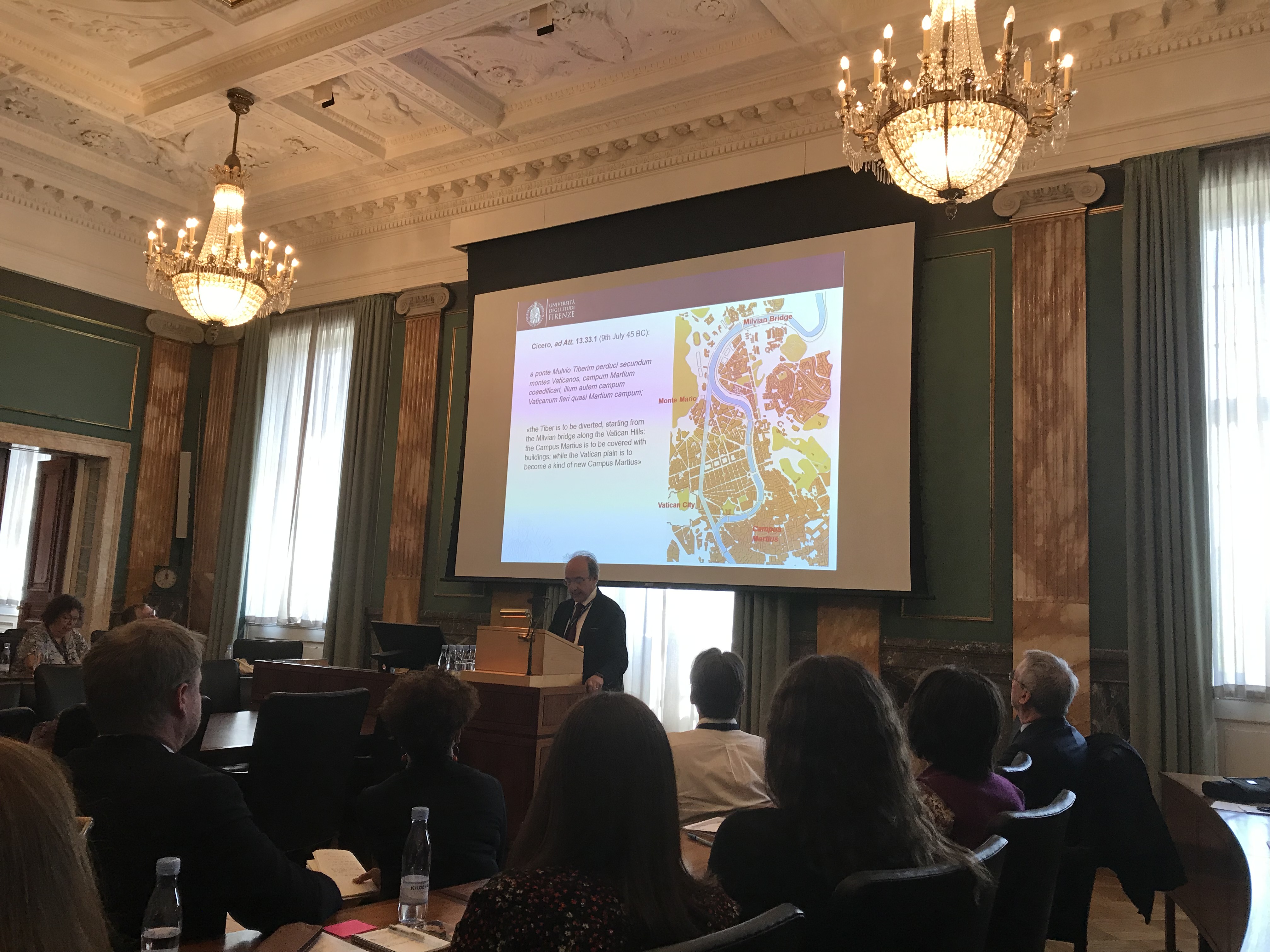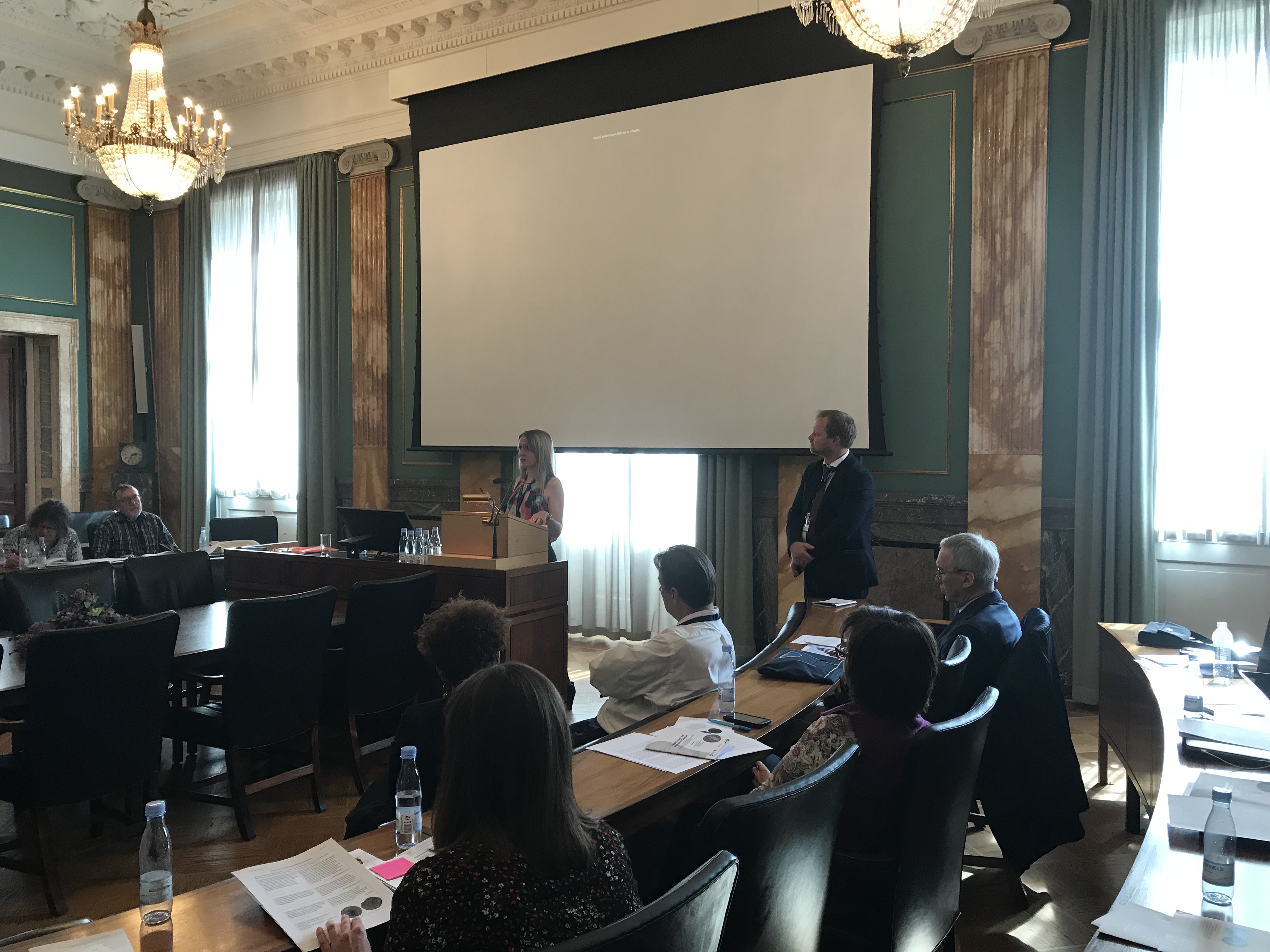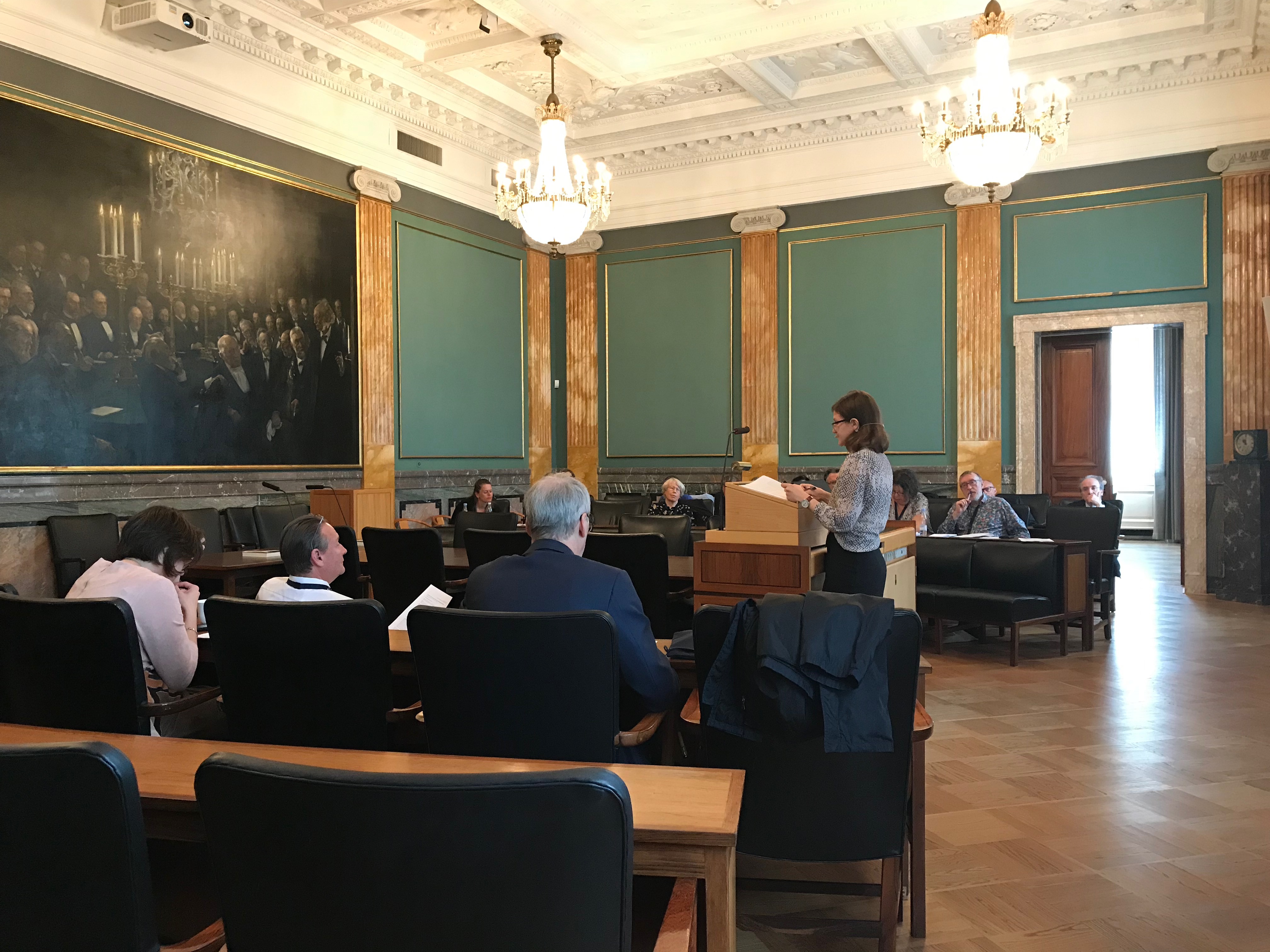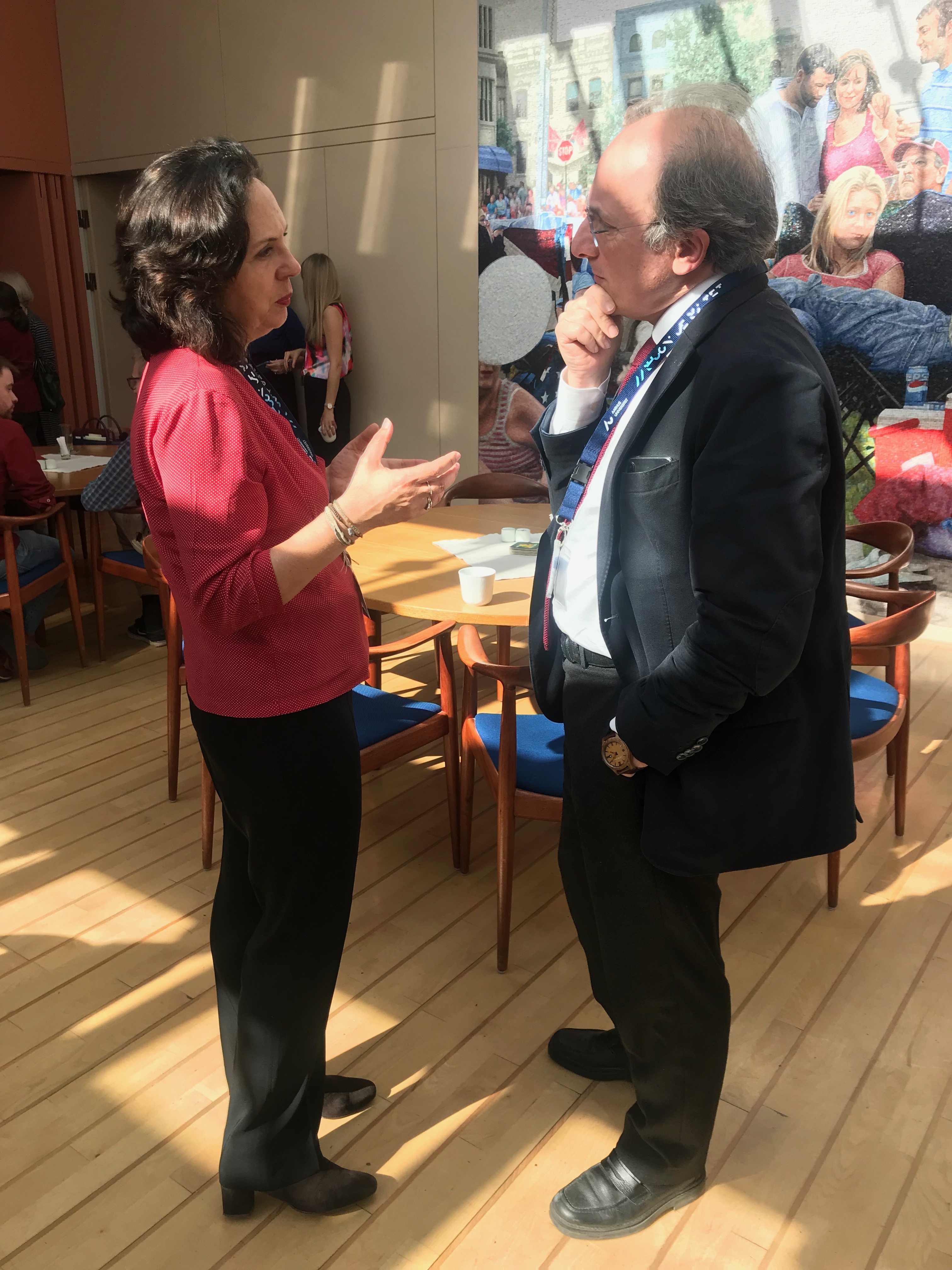Caesar's Past and Posterity's Caesar
Conference summary by PhD students Nora Petersen and Nikoline Sauer.






Caesar’s Past and Posterity’s Caesar
On the 29th and 30th of April 2019, a conference with the topic “Caesar’s Past and Posterity’s Caesar” took place at the Royal Danish Academy of Sciences and Letters in Copenhagen, Denmark. The conference was a synergetic venture between The Carlsberg Foundation-funded project Excavation of Julius Caesar’s Forum in Rome, the Danish National Research Foundation’s Centre of Excellence for Urban Network Evolutions (UrbNet), and Trine Arlund Hass’ Postdoc Our Caesar: Danish receptions of Gajus Julius Caesar, also funded by The Carlsberg Foundation.
Caesar’s Past and Posterity’s Caesar was organized by Professor Rubina Raja (Aarhus University), Postdoc Trine Arlund Hass (Aarhus University), Dr. Jan Kindberg Jacobsen (The Danish Institute in Rome) and Postdoc Sine Grove Saxkjær (Aarhus University and The Danish Institute in Rome).
During the two days, archaeologists, historians, historians of religion and philologists presented their recent research results. The conference addressed two main questions: 1. How did Caesar use the ancient/Roman past to construct himself and launch himself for a position as head of the Roman state and empire? 2. How has posterity seen Caesar, and how has Caesar been used in posterity in Italy and beyond?
Each paper was followed by a group discussion.
The conference was linked to the research project undertaken by postdoc Trine Arlund Hass “Our Caesar: Danish receptions of Gaius Julius Caesar” along with the ongoing excavation project “Excavation of Julius Caesar’s Forum in Rome”. The excavation in the Forum of Caesar is a collaboration between The Danish Institute in Rome and the Roman Municipal Department of Antiquities: the Sovrintendenza Capitolina ai Beni Culturali. The intention of the conference was to bring scholars together who work on the receptions of Caesar – an endeavour spanning disciplines and comfort zones.
Rubina Raja (Aarhus University, UrbNet) and Jan Kindberg Jacobsen (The Danish Institute in Rome), the Danish PIs of the excavations of Caesar’s Forum, introduced the conference and presented the opening paper “Danish-Italian excavations at the Forum of Caesar: Status Quo”.
The first paper “Caesar the orator in retrospect” was given by Henriette van der Blom (University of Birmingham), who provided insight into Caesar’s legacy as a brilliant orator, writer, and politician in the literary sources from the first couple of centuries of the Imperial period. The focus was on the Dolabella speech and why it became so popular.
Carsten Hjort Lange (Aalborg University) presented a paper with the title “The invention of civil war writing: The (curious) case of Caesar”. He explored the need of Caesar and Augustus to legitimize the civil war of the Late Republican period, and how civil wars were viewed compared to foreign wars. Caesar was presented as the inventor of civil war writing as a powerful and effective justification of actions taken.
Rubina Raja (Aarhus University, UrbNet) presented the next paper “Creating a memory of urban Rome: The case of the Forum Iulium” with Jörg Rüpke (Max-Weber-Kolleg, Universität Erfurt) in absentia. Their paper focused on the Forum Iulium, which began as a memorial extension of the Forum Romanum. The Forum Iulium was explored through archaeological and literary sources.
Paolo Liverani (University of Florence) and his paper “Caesar and the pomerium of Rome” gave insight into a large building project of Caesar’s, which included a potential diversion of the Tiber river to extend the pomerium of Rome and make the Vatican plain the new Campus Martius. Caesar’s plans were explored through Tacitus, Cassius Dio, Seneca and letters of Cicero.
Jesper Majbom Madsen (University of Southern Denmark) presented the paper “From dynast to legitimate monarch: Caesar’s dictatorship in the writing of Cassius Dio”. He investigated Dio’s view of the dictatorship of Caesar, who contrary to other earlier literary sources saw the dictatorial step as a necessity.
Bridget England (University College London) presented her paper “Caesar’s place in the course of Tiberian historiography”, which was the first chapter of her PhD thesis. She used the Historia of Velleius Paterculus to explore Caesar’s literary reception during the reign of Tiberius.
Sine Grove Saxkjær (The Danish Institute in Rome/Aarhus University) presented her paper with the title “Memory and monarchy: Histories of the Roman gentes and/or the Roman national history”. She focused on Caesar’s use of the cultural memory of the earlier Roman kingdom and the importance of the legendary ancestries of Roman aristocracy as a key to political success in the Late Roman Republic.
Giuseppe Zecchini (Universitä Cattolica del Sacro Cuore) explored the renown of Caesar in Late Antique literary compositions and oral memory in his paper “Julius Caesar in western Late Antiquity”. The paper attempted to answer four principal questions: Which place does Caesar occupy in Roman history? How was Caesar’s personality and the moral judgements against him? How was Caesar as a conqueror? And what was the relationship between Caesar and the barbaric world of Northern Europe?
The second day of the conference began with a paper by Marianne Pade (The Danish Institute in Rome) bearing the title “Should they rot in Hell? Fifteenth-century discussions of Brutus and Cassius”. She discussed the reception of Caesar through Dante’s Divine Comedy and a number of texts related to the so-called Caesar-Scipio controversy.
The remarkable portrayal of Caesar in Ben Jonson’s play from 1611 was the focal point of Miryana Dimitrova’s (King’s College London) paper “Lurking in the Jacobean shadows – historicity and topicality of the character of Julius Caesar in Ben Jonson’s play Catiline: His conspiracy”. The paper explored the character of Caesar in the play as well as the play’s possible contemporary criticism of James I’s royal power.
Thomas Biskup (University of Hull) presented the paper “Caesar in Berlin: Frederick the Great, Voltaire, and the Enlightenment debate about historical greatness”. He focused his paper on Caesar as a central point of reference in writings of the King of Prussia, Frederick II, as well as contemporary authors. Furthermore, he shed light on the debates on Caesar in the historical period of the Enlightenment.
The paper “Nineteenth-century Caesar: Caesar in a time of Danish national awakening” by Trine Arlund Hass (The Danish Institute in Rome/ Aarhus University) studied the role of Caesar in selected writings of influential Danish writers of the 19th century, e.g. H.C. Andersen and N.F.S. Grundtvig,
Maria Wyke (University College London) presented the final paper of this conference. Her paper “Lessons in leadership: Bernard Shaw’s Caesar on stage and screen” studied George Bernard Shaw’s characterization of Caesar in the play Caesar and Cleopatra and explored lessons in leadership through Shaw’s Caesar.
In conclusion, Christopher Hallett (University of California, Berkeley) summarized and reflected on the reception of Caesar, and the conference ended in a productive and engaging final discussion. Conference proceedings have been planned.
The two-day conference brought together scholars from across academic disciplines initiating fresh ideas and points of view. Speakers from Denmark, the US, Italy, Germany, and the UK presented exciting views on Julius Caesar through as varied mediums as playwrights, philosophers, royals, writers, and historians making use of both historical and archaeological evidence.
Contrasting views throughout history makes it difficult to form a consistent vision of Julius Caesar. His contrasting self-promotion can quite easily be pulled in opposite directions, and his subsequent image can therefore perhaps be said to be used differently according to the intentions and plans of later writers and leaders.
How many historically exploited versions of Caesar do we have to dig through to get to the real one, one might ask?
We are indebted to all participants and speakers, and heartily thank them for their contribution at this conference. Furthermore, we would like to thank The Royal Danish Academy of Sciences and Letters in Copenhagen for hosting the event. We also thank the Ny Carlsberg Glyptotek warmly for receiving our participants at the end of the conference. Finally, we are most grateful to the Danish National Research Foundation and The Carlsberg Foundation for funding this conference through the Centre for Urban Network Evolutions (UrbNet) and the project ‘Excavation of Julius Caesar’s Forum in Rome’.
